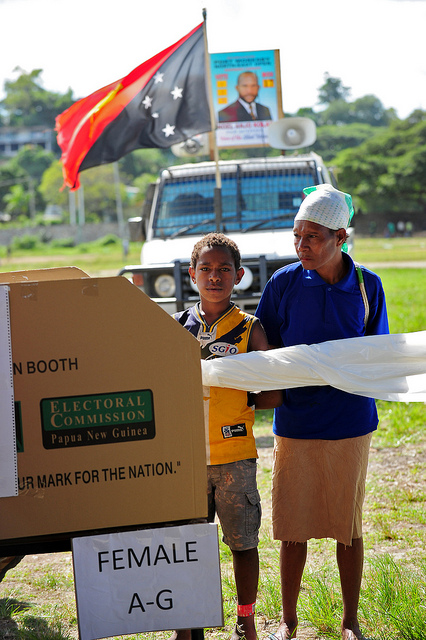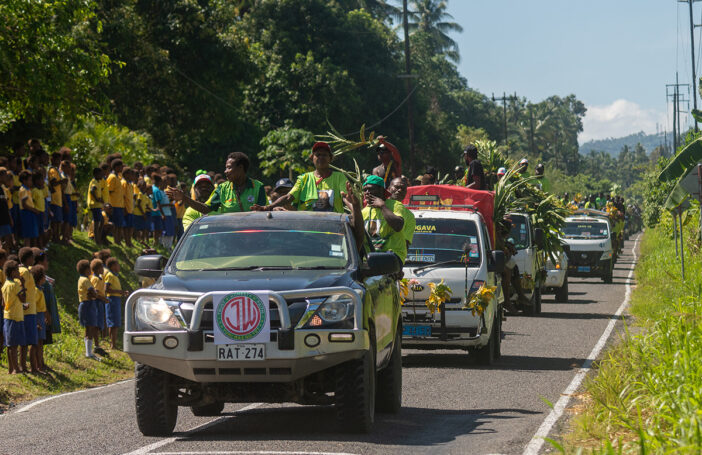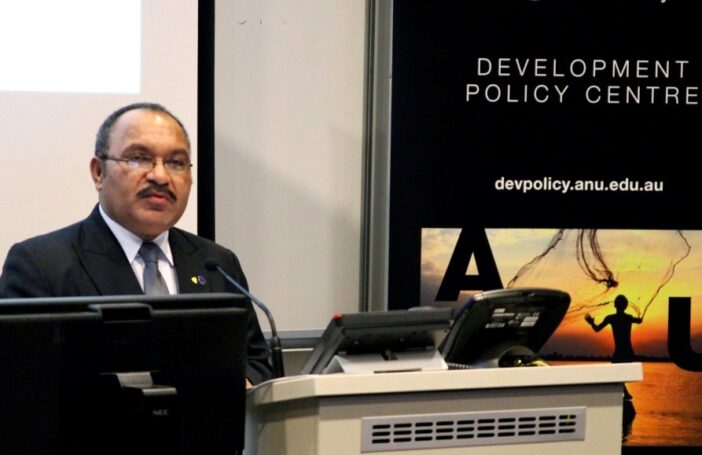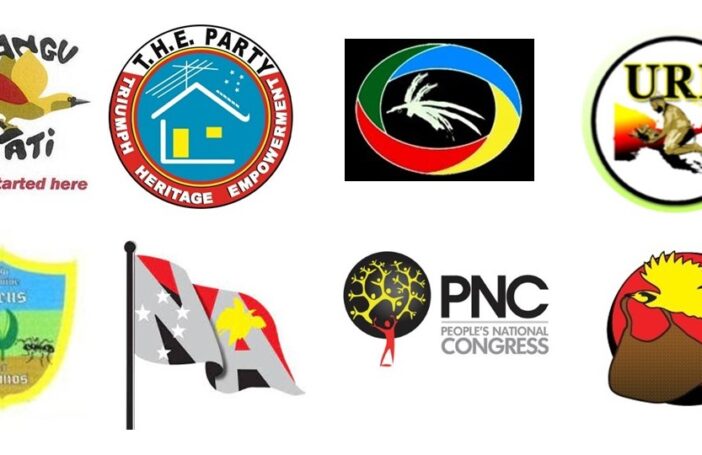In this post, which forms part of a series of SSGM In Briefs considering the success or otherwise of the 2002 reforms to Papua New Guinea’s Organic Law on National and Local-Level Government Elections, we examine the extent to which the introduction of limited preferential voting (LPV) has influenced local political culture, particularly with respect to money politics. In doing so, we draw on the findings of the 2007 and 2012 domestic observation reports (Haley and Anere 2009; Haley and Zubrinich 2013). LPV was introduced in the that hope elections would become more peaceful and would see the election of members of parliament with wider and more representative mandates.
The proliferation of ‘money politics’
Evidence gathered by observers during the 2007 and 2012 elections shows that money played a huge part in both elections. Since the introduction of LPV, ‘money politics’ is more significant than ever before. In contrast to earlier elections, widespread vote buying was reported in 2007 and 2012, with candidates (winning and losing alike) spending millions offering incentives to voters. For the most part, candidates who campaigned with money and gifts performed better than those who did not. Vote buying was evident in every electorate in which observations took place, and citizen surveys revealed an unprecedented amount of gifting with food, pigs and other material items including boats, trucks and ambulances. It is noteworthy that money politics has spread beyond the highlands and is now evident in parts of Papua New Guinea where there are no ‘big men’ and where cultures of competitive exchange are largely absent.
Nonetheless, vote buying continues to be most pervasive in the highlands, although the largest individual payments reported in 2012 were made outside the highlands. One campaign manager interviewed claimed to have distributed K12 million on the eve of polling, while observers in Northern (Oro) Province reported that ‘gifting, vote buying and bribery seem … to have become the accepted norms of electoral politics in the province’. Formerly a feature of elections in the highlands, campaign houses and men’s houses are now central to the distribution of cash and gifts around the country.
As in 2007, votes were bought, sold and marketed, with typical payment configurations of K100, K50, K20 and K50, K20, K10 for 1st, 2nd and 3rd preferences respectively. In the highlands, individuals received as much as K3,000 for first preference votes in 2012 compared with K1,000 in 2007. Observers also noted the competitive nature of vote buying in 2012, reporting that ‘money candidates’ sought and gained prestige through increasingly larger payments to would-be voters. Cashed-up candidates were also reported to have made larger payments of K10,000–15,000 at the household level, with one winning candidate in Jiwaka Province reporting that he handed out K2 million in cash inducements. Another described himself as a ‘walking automatic teller machine’, while a losing candidate in Chimbu (Simbu) Province claimed to have spent K6 million buying votes.
A new era of opportunism
LPV provides new opportunities with respect to vote buying. Voters now have three preferences to sell, and sell them they do. At several locations observers saw signs reading ‘Votes for Sale’. In many places, voters capitalised on the new opportunities LPV provides by moving across electoral boundaries to vote in two or more electorates (cf. Haley and Dierikx 2011). Particularly enterprising voters also capitalised on the rolling elections in the highlands by voting in several provinces.
Mt Hagen settlers from Southern Highlands, Hela and Enga provinces, for example, were noted to have voted in their home provinces before voting in Mt Hagen, while observers in Eastern Highlands and Chimbu noted the arrival of trucks and buses loaded with people who had voted in Lae (Morobe Province). Those from Lae were specifically targeted by candidates and campaign managers, and were the principal beneficiaries of cash for votes on polling day.
Church congregations and clan, youth and women’s groups have also benefited through the advent of novel fundraising activities made possible by LPV. For example, grandstands, platforms and opening ceremonies were used to great effect during both the 2007 and 2012 elections, with community groups inviting open and provincial candidates to speak at and support their event. In the highlands such events typically netted event organisers K10,000–40,000 in donations from candidates vying for uncommitted minor preferences.
Money politics and leadership
Since the introduction of LPV, local leaders are no longer in a position to mediate the flow of money and gifts at election time. Instead, money now flows directly to individual voters, even in areas where there are strong local candidates. Previously, communities without a strong local candidate were favoured by candidates seeking to buy votes.
Gone, too, are the days when wealthy candidates distributed largesse to supporters as a means of creating indebtedness to sure-up votes. Instead, candidates must now rely on larger and larger networks to finance their campaigns. Indeed, wealthy businessmen and community leaders ‘back’ candidates by contributing towards their campaigns to create indebtedness and ensure the candidate is beholden to them should electoral success ensue.
Money politics is strongly gendered
Overall, a greater proportion of people in the highlands than elsewhere in the country received cash for their votes. Within electorates, men typically received money more often than women, and in larger amounts. For example, the 2012 domestic observation found that 47 per cent of highlands men and 39 per cent of highlands women had received cash from candidates. The average amount received by highlands men was K488 and the average received by women was K264. Similarly, Momase men, on average, received K468 while women received K196, demonstrating that money politics is strongly gendered. Regardless of the amounts received, and even in electorates where few respondents admitted to having received cash for their votes, there was general agreement that vote buying and gifting were more significant in 2012.
Conclusion
Since the introduction of LPV, the incidence of money politics and political gifting has proliferated. Concomitantly, the nature of money politics has changed, and while money now flows to the community at election time, men benefit the most. Of course money is not the only factor influencing voter choice. Where there is a strong local candidate, voters invariably vote locally regardless of whatever cash or gifts they may have received. Nevertheless, even diehard supporters now have minor preferences to assign, and it is these that are fuelling money politics. Moreover, the introduction of LPV has required a lot of effort and expense for very little gain, and it may be that in the longer term the negative consequences, such as the proliferation of money politics, will far outweigh any perceived benefits.
 Nicole Haley is the convenor of the State, Society & Governance in Melanesia (SSGM) Program at ANU. Kerry Zubrinich is a research fellow at SSGM. This blog post was originally published as SSGM In Brief 2015/30.
Nicole Haley is the convenor of the State, Society & Governance in Melanesia (SSGM) Program at ANU. Kerry Zubrinich is a research fellow at SSGM. This blog post was originally published as SSGM In Brief 2015/30.
Haley, N. and R. Anere 2009. The 2007 Papua New Guinea National General Elections Domestic Observation Report. Special Publication No. 52. Port Moresby: The National Research Institute.
Haley, N. and B. Dierikx 2011. Guns, Money and Sex: Assessing the Impact of Electoral System Reform on Political Culture in Southern Highlands Province. In R.J. May, R. Anere, N. Haley and K. Wheen (eds). Election 2007: The Shift to Limited Preferential Voting in Papua New Guinea. Boroko and Canberra: National Research Institute and SSGM, ANU, 307–21.
Haley, N. and K. Zubrinich 2013. 2012 Papua New Guinea General Elections Domestic Observation Report. Report prepared for Cardno Emerging Markets






The insights in this blog are of course significant, but raise also questions. First, it may be worthwhile to look more closely at situations where big spending did not produce the desired outcome. It may be that “candidates who campaigned with money and gifts performed better than those who did not”, but this is too general. It may be that the popular voice can overrule the influence of money. Secondly, PNG elections have many candidates and therefore many losers. It has to be explained why many candidates spend a lot of money while the chances to win are very slim. Is this conscious gambling or being driven by a dream? Many candidates in Western Province in 2012 dreamt that they would win. (Information from Wesley Serber). Thirdly, there is a question where the money does come from. The benefits from natural resource extraction are distributed much more widely than before. The increased access to money may be a more important factor than the introduction of LPV.
It was full Optional Preferential Voting in the Elections from 1964 to 1977 which delivered Members who were largely representative of their whole electorate. Vote buying was established by the First Past the Post system. Limited Preferential Voting for only 3 candidates never had any chance of remedying the problem. This is why the Members, who had been elected by buying votes agreed to its introduction. Having to buy 3 preferences was never going to be a problem to them. They knew they had to appear to being doing something, so they agreed to the limitation of 3 preferences, knowing that they could still buy themselves back in. Full Preferences would not only have been too expensive, but also to complex and difficult to manage. Do not underestimate the political nous of PNG politicians!
I concur. As someone who was part of the team assessing the introduction of photo ballot papers many years ago and who has observed early PNG elections, I believe it was a tragedy that the ‘first past the post’ system was introduced. It accelerated other divisions in society, and PNGians have shown themselves to be most adept at using systems for their own benefit. However, I would like to know if the authors did some quality control on the estimates of how much money was paid by candidates, and considered where the money came from!